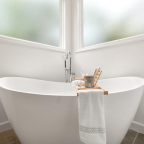
Triple Glazing and How it Helps Noise Reduction
In the heart of our bustling cities and expanding suburbs, the quest for tranquilly within our homes has never been more paramount. As cities become louder the need for a solution in our home becomes more important. Triple glazing window replacements can be a smart investment in any home, as they not only reduce noise but also improve your insulation and future-proof your property. Furthermore, having multiple panes of glass helps reduce condensation that could potentially lead to harmful mould.
Installing triple glazing from specialists can be an ideal way to improve any home. It offers many advantages over single glazed windows, such as reduced noise pollution and warmer homes with less condensation buildup. Furthermore, triple glazing windows tend to be more durable and harder to break into than their single glazed counterparts, but it is essential that climate be considered when considering whether triple glazing would benefit your living situation.
In this blog we will look at triple glazing and how it can help you reduce noise in your property.
Reduced noise
One of the main reasons experts say triple glazing can be a fantastic investment for your home is that it dramatically decreases noise pollution while providing other advantages such as better insulation, reduced condensation, and enhanced security.
These types of windows make it more difficult for noise to enter your home. Sound waves that strike the glass must travel over three layers before weakening; this ensures less noise enters and makes life much quieter inside your house.
Noise pollution from outside can not only disrupt your sleep but can have serious repercussions for your overall quality of life. Triple glazed windows help block external noises for a quieter home.
Three panes of glass provide exceptional sound insulation, and filling their spaces with argon gas further improves their acoustic performance. Argon gas is colourless, odourless, non-reactive, and denser than air, thus reducing heat transfer between panes of glass. Krypton gas may offer even greater soundproofing effects.
Thicker glass and wider gaps between panes also play a key role in a window's sound-reducing capabilities, with too thin windows allowing more noise into your home than desired, while larger gaps provide a stronger barrier against unwanted sounds, although too wide gaps may cause resonance and increase noise transmission. It is also essential that seals remain undamaged; any damage can compromise their acoustic performance and make them less effective at soundproofing.
Triple glazing windows feature three thicknesses of glass that work to mitigate noise at different frequencies, while the polyvinyl butyral (PVB) interlayer helps seal off air gaps between windows to further lower noise levels.
Triple glazing may be expensive to install, but its benefits in terms of noise insulation make it well worth the expense for most people.
Increased Energy Efficiency
No matter if you live by a busy road or have noisy neighbours, soundproof glass layers can make a substantial difference to the quality of life in your home. Triple glazing also provides better insulation and energy-saving benefits.
Triple glazing windows utilise three panes of glass with air spaces between each pane, as well as being filled with gases such as argon. Compared to double glazing, these windows use more material and contain additional gases, such as argon, to provide insulation properties.
Gapping between glass panes helps in reducing noise penetration by weakening soundwaves, and the variation in thickness and density among different layers helps in reducing echos and vibrations.
Triple glazing windows may be more expensive than their double-glazed counterparts, but they can be worth investing in when living in extremely cold climates as they prevent heat loss from your home. Furthermore, triple glazed windows can easily be fitted into existing timber frames, allowing you to maintain an aesthetically pleasing home while taking advantage of their soundproofing qualities.
Triple Glazing Reduces Condensation

Triple glazed windows have another little-discussed benefit: they help reduce condensation in the home! This is due to having two additional panes of glass and an argon gas fill between panels, which makes heating them less likely and thus reduces condensation formation.
Condensation can be a serious health hazard in many households, and it is an unsightly annoyance as well. Common causes include poorly heated or ventilated homes, which lead to dampness, mould growth, and health concerns.
The Science of Sound and Triple Glazing
Sound travels in waves, and when these waves hit a barrier, such as a window, they cause the material to vibrate, transmitting the sound through. The more barriers these waves have to pass through, the weaker they become. With triple glazing, the sound waves must navigate through three layers of glass and two layers of gas or vacuum spaces. Each layer acts as a dampener, absorbing and dispersing the energy of the sound wave, thereby reducing its intensity.
Furthermore, the inert gases used in the spaces between the panes are denser than air, providing an additional layer of sound insulation. This density disrupts the sound waves' path, further muffling unwanted noises from the outside.
Additional Benefits
Beyond noise reduction, triple glazing offers a plethora of other benefits. The extra panes and gas-filled spaces enhance thermal insulation, making homes warmer in the winter and cooler in the summer. This not only provides comfort but can also lead to significant savings on energy bills. Additionally, the robust structure of triple-glazed windows offers heightened security against potential break-ins.
Main image by Freepik



















